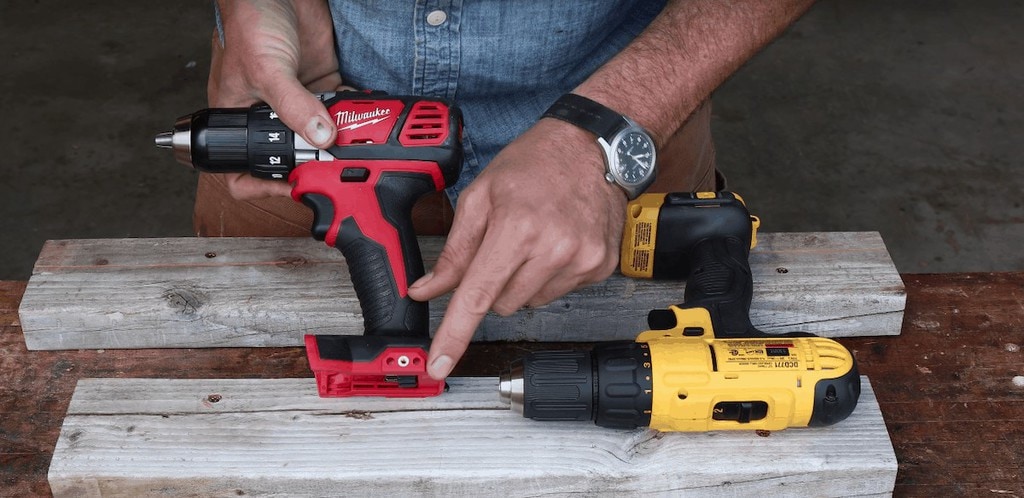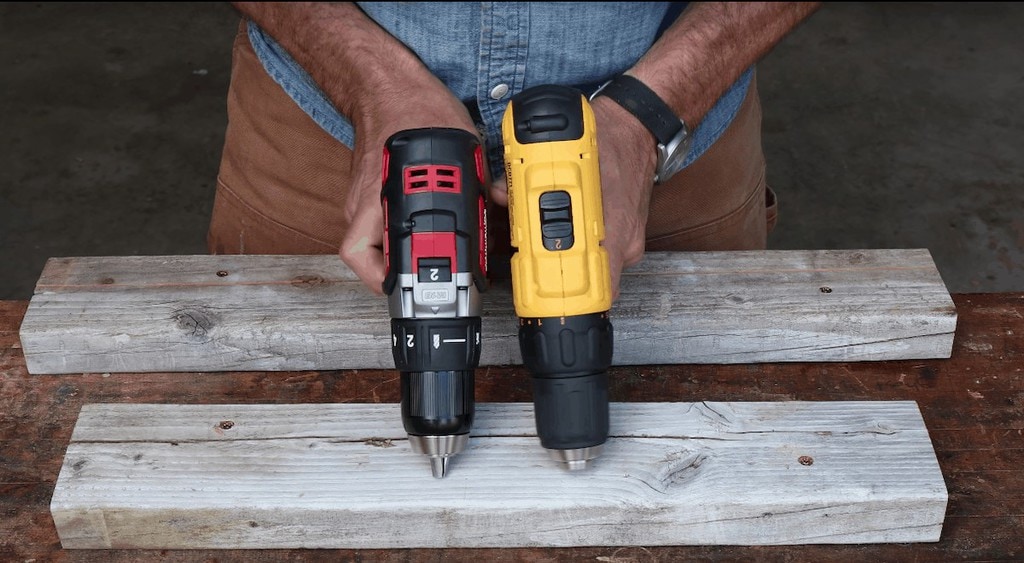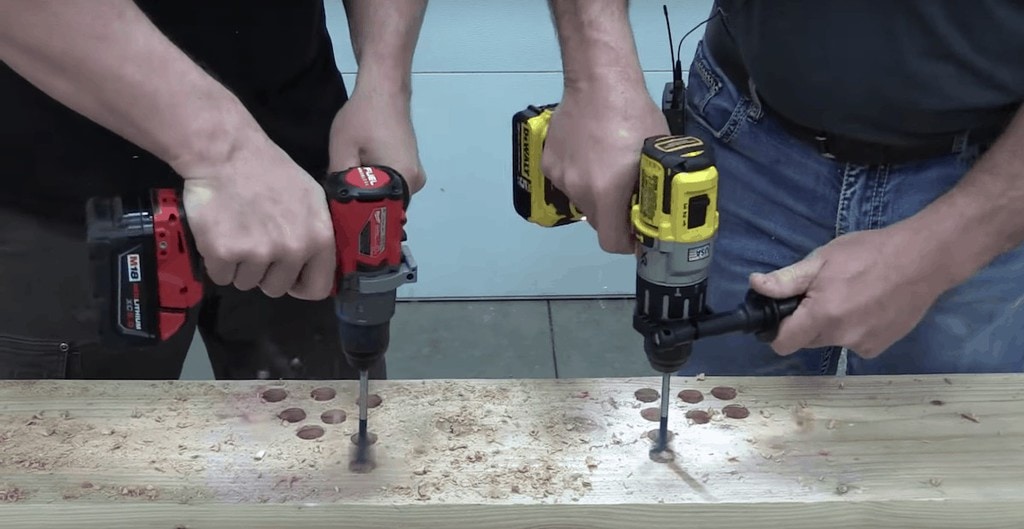The Clear Winner Is...
Alright, we’re here to settle - once and for all - the great and never-ending debate between Milwaukee and DeWalt tools. Which one is better, you’ve always wondered? By the end of this article, we’ll establish hands-down which of the two is the unassailable, indisputable Power Tool King.
Just kidding. We can’t do that.
Some arguments, after all, just can’t be won. Anyone who’s married knows this.
Nevertheless, you’ll never cease to come across both DIY’ers and professionals alike, who will swear by a particular brand with an authoritative, unconditional level of conviction.
Example: ‘I’ve been a professional carpenter for ___ years, and I’ll NEVER own anything other than DeWalt.’
Or: ‘I’m a commercial contractor, I’ve tried every tool on the market, and nowadays I never touch anything except Milwaukee.’
And so on and so forth.
So what’s the deal? Where’s a beginner supposed to start?
The first thing we’ll say right off the bat, is that DeWalt and Milwaukee are both quality, reputable companies that manufacture fine tools. We’re actually big fans of both. (That’s a huge help, right?)
What we’ll do in this article, then, is provide you with the real skinny on each brand: everything from their history to their warranties to their manufacturing countries. Also, we’ll do a head-to-head comparison of each of their respective cordless tool kits; purchasing a kit is a hefty investment - the least we can do is help you out with your decision by picking out a few details that we think are worth considering.
Hopefully, then, by the end of the article you can feel informed enough to go and decide for yourself which side of the Milwaukee/DeWalt divide you want to stand on - after all, we want to ensure that that never-ending rivalry continues to rage on, right?
Right.
Talk to a tool expert in minutes, 24/7
Talk to a tool expert in minutes, 24/7
16,216,105
questions answered
11,990
verified experts
Beginnings: Brief histories of the DeWalt and Milwaukee brands
As it turns out, DeWalt and Milwaukee actually share strikingly similar stories as to how they originated; both companies began in the early 1920’s, and both built their respective successes off of revolutionary new tool designs, superb engineering, quality craftsmanship, and intelligent marketing.
Likewise, they both shared similar fates throughout the generations as they eventually sold out to massive, multinational corporations (more on that later). For now, let’s just take a brief look at the history and progression of each company throughout the years.
DeWalt Tool Brand
- Started in 1924 when Pennsylvania-born Raymond DeWalt invented, patented, and marketed the original radial arm saw - the ‘DeWalt Wonder Worker’. This was a revolutionary tool that allowed raw lumber to be cross-cut with unheard of speed and accuracy.
- Originally headquartered in Lancaster, Pennsylvania
- Purchased in 1949 by the American Machine Foundry (AMF), which owned the DeWalt name for 11 years until they sold it in 1960 to Black and Decker (still owns DeWalt to this day)
- Revolutionized the handheld, cordless power tool market in the early 1990’s with highly efficient lines of electric saws, drills/drivers, screwdrivers, and wrenches
Milwaukee Tool Brand
- Also started in 1924, when A.F. Seibert of Milwaukee, Wisconsin purchased the manufacturing rights for a small power drill called the ‘Hole-Shooter’ (which was originally designed by A.H. Petersen for Henry Ford). The Hole-Shooter was Seibert’s flagship product for his newly-started electric tool repair business - the Milwaukee Electric Tool Company
- Along with the power drill, Milwaukee also successfully engineered, marketed, and produced a line of electric sanders, hand grinders, and hammer drills in their early years - all of which were powered by the company’s proprietary electric motors
- Sold to Amstar Corporation in 1975. Sold to Merrill Lynch in 1986. Sold to Atlas Copco in 1995. Sold to Techtronic in 2005 (current parent corporation)
So, what does all that buying and ‘selling out’ mean to you, the consumer?
Well, that kind of depends on personal preference. The truth is, both of these companies have long since abandoned their traditional American roots, and have ‘sold out’ and outsourced the majority of production in order to maximize profits.
That being said, we’ve got to mention that DeWalt has recently taken some admirable steps towards increasing production of their tools here within the U.S. - in 2013 they announced their ‘Tools of the Brave’ initiative that saw the opening of seven new manufacturing facilities across the midwest and eastern parts of the country, with plants opening in Connecticut, Indiana, Maryland, Kentucky, N. Carolina, S. Carolina, and Tennessee.
In addition, DeWalt’s parent company - Stanley Black and Decker - is a well-know, household American name that goes back farther than the DeWalt brand itself (1910), and is headquartered in Towson, Maryland.
In contrast, Milwaukee’s parent company - Techtronic Industries - is a multinational investment company based out of Hong Kong (although the Milwaukee brand itself is headquartered in Brookfield, Wisconsin).
So, take that information as you may.
In either regard, the majority of both companies’ manufacturing is outsourced, with the overwhelming percentage of their products coming from China.
Warranties
Both DeWalt and Milwaukee offer a range of different warranties, depending on each specific product (See DeWalt warranties and Milwaukee warranties). Instead of making a huge, vast list covering each tool and its respective warranty, we’ll just consider the cordless combo kits that we’ve reviewed below:
DeWalt: 3-year Limited Warranty: Any tool that fails due to manufacturer defect, will be replaced/repaired free of charge
Milwaukee: 5-year Limited Warranty: Same deal as DeWalt, except the warranty is good for 5 years instead of 3.
Pretty clear who the winner is in the warranty category.
Combo Kit Comparison
[sc name="Milwaukee versus DeWalt"]
DeWalt 20-volt MAX 5-tool kit vs. Milwaukee M18 6-tool kit
The most obvious difference between these two kits is that the Milwaukee package has six tools, whereas the DeWalt only has five. Is that extra tool worth the extra cost? Let’s take a look.
DeWalt DCK590L2 Li-Ion MAX 20-Volt 3.0 5-Tool Combo Kit
Last update on 2024-10-31 / Affiliate links / Images from Amazon Product Advertising API
- ½” Hammer drill
- Reciprocating saw
- ¼” impact driver
- LED work light
- 6 ½” circular saw
- Two 20-volt MAX Li-Ion 3.0 batteries
- Battery charger
- Detachable handle
- Belt hook
- Heavy duty contractor bag
Milwaukee 2696-26 M18 Cordless Li-Ion 6-Tool Combo Kit
Last update on 2022-08-31 / Affiliate links / Images from Amazon Product Advertising API
- ½” Hammer drill
- SAWZALL Reciprocating saw
- 6 ½” Circular saw
- ¼” Impact driver
- 4 ½” Angle grinder/cut-off
- M18 work light
- Two M18 REDLITHIUM XC 18-volt battery
- Battery Charger
- Heavy duty contractor bag
So, the ‘extra’ tool in the Milwaukee kit is the 4 ½” angle grinder, essentially. Is this worth the extra cost?
In our opinion, yes.
Truth be told, we love angle grinders/cut-off discs, and we feel they’re a bit underappreciated and underused in the DIY world.
If you’ve never used one, give it a shot and you’ll see what we’re talking about - we’ve used them on everything from cutting off catalytic converters to prepping boat hulls for new gelcoat.
Ok, so you’ve got the extra angle grinder in the Milwaukee kit. What else is there worth mentioning about the two packages?
Here’s another thingto consider:
- The DeWalt kit is advertised as a MAX 20V, which may come off as slightly more powerful than the 18V from Milwaukee, but for all practical purposes, power-wise consider them equal. They both produce an operating voltage of around 18V and both have a peak voltage around 20V. DeWalt just chose to advertise as a 20V battery while Milwaukee chose 18V.
Bottom Line
Alright, so what’s the verdict?
Essentially, you’ve got four major things to consider:
- Milwaukee’s 5-year warranty vs. DeWalt’s 3-year
- Milwaukee kit has an angle grinder
- DeWalt kit is substantially cheaper
If it were us, and we had to choose, we’d go with the DeWalt combo. Sure it’d be great to have the extra angle grinder and longer warranty, but for overall value, the DeWalt package just makes more sense.
Ready to Choose?
That being said, the tools in both kits really are great quality - we highly doubt that you’ll be disappointed, no matter which one you choose.







The statements on voltage in this article are very misleading. While Milwaukee’s 18v and DeWalt’s 20v batteries appear obviously different, in reality they’re identical. The only real difference is marketing fluff – 18v is the more honest rating, citing the total nominal voltage of the 3.6v batteries inside the battery pack, while DeWalt uses the pumped up 20v figure which is the total peak rating of the same aforementioned 3.6v batteries.